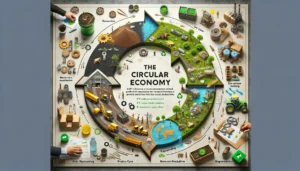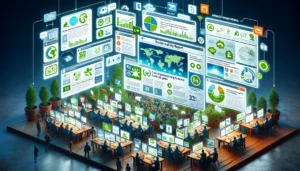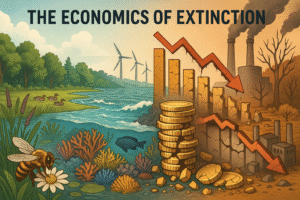In an era where environmental concerns are more pressing than ever, sustainable business models (SBMs) are not just beneficial; they’re essential. These innovative frameworks allow companies to thrive while respecting the planet and fostering social well-being. But what exactly is a SBM, and how is it changing the face of business today? Let’s explore how businesses are integrating sustainability into their core, creating value for themselves, their communities, and the world at large.
 Triple Bottom Line Focus
Triple Bottom Line Focus
The concept of the Triple Bottom Line (TBL) is revolutionary, pushing businesses to look beyond the traditional single bottom line of profit to also consider their impact on people (social equity) and the planet (environmental sustainability). In practice, businesses must evaluate their success not just by the financial returns they generate but also by their contributions to social welfare and their ability to reduce or eliminate environmental harm. Companies adopting the TBL approach often engage in fair labor practices, support community initiatives, and invest in green technologies. By doing so, they demonstrate that economic success can go hand-in-hand with ecological balance and social fairness, creating a more sustainable world for future generations.
Value Creation and Delivery
At the heart of sustainable business models lies a commitment to creating and delivering value in ways that enrich society and protect the environment. This involves rethinking what we produce, how we produce it, and for whom we produce it. For example, a company might develop a new line of products made entirely from recycled materials, thereby reducing waste and conserving resources. Or, a service provider might offer solutions that help other businesses reduce their carbon footprint. This focus on sustainable value creation is not just about minimizing harm; it’s about actively contributing to the well-being of customers, communities, and the planet. By innovating products and services with sustainability in mind, businesses can meet today’s needs without compromising the ability of future generations to meet their own.
 Circular Economy Principles
Circular Economy Principles
The circular economy represents a shift from the traditional linear model of consumption (“take, make, dispose”) to a more sustainable approach that designs out waste and pollution, keeps products and materials in use, and regenerates natural systems. This principle is foundational to sustainable business models, encouraging companies to rethink their production and consumption processes. For instance, a fashion brand might implement a take-back program for used garments, recycling the materials into new clothing. Similarly, a manufacturer could design products to be easily disassembled and repaired, extending their lifespan and reducing waste. By embracing circular economy principles, businesses not only reduce their environmental impact but also open up new opportunities for innovation, cost savings, and customer engagement.
Stakeholder Engagement and Collaboration
Stakeholder engagement and collaboration are the linchpins of any successful sustainable business model. This approach goes beyond traditional business practices by actively seeking input and partnerships with a broad range of stakeholders, including customers, employees, suppliers, communities, and even competitors. The goal is to create a shared value that benefits not just the company but all involved parties. For instance, a business might collaborate with local communities on environmental projects or work with suppliers to improve labor practices. This inclusive approach fosters innovation, strengthens relationships, and enhances the company’s social license to operate. By building a collaboration network, businesses can address complex sustainability challenges more effectively and drive collective progress toward a more sustainable future.
 Transparency and Accountability
Transparency and Accountability
In the realm of sustainable business, transparency and accountability are not optional—they are fundamental. Consumers, investors, and the broader public are increasingly demanding that companies be open about their environmental and social impacts. This has led businesses to adopt practices such as publishing sustainability reports, undergoing third-party audits, and actively communicating their sustainability goals and achievements through various media channels. Such transparency not only builds trust with stakeholders but also holds the company accountable for its actions, driving continuous improvement. Moreover, it enables consumers to make informed choices, supporting businesses that align with their values. In a world where information is at everyone’s fingertips, being transparent and accountable is a powerful way for businesses to stand out and reinforce their commitment to sustainability.
Resilience and Adaptability
The capacity for resilience and adaptability is what sets truly sustainable businesses apart. In an ever-changing global landscape marked by environmental challenges, shifting consumer preferences, and evolving regulatory environments, the ability to adapt and thrive is crucial. Sustainable businesses are inherently forward-thinking, embedding flexibility into their operations and business models to respond to external pressures and seize new opportunities. This might involve diversifying energy sources to include more renewables, adapting product lines to meet emerging consumer demands for sustainability, or innovating new business models that reduce environmental impact. Such resilience ensures the business’s longevity and contributes to a more stable, sustainable economy. By preparing for the future, adaptable businesses can navigate the uncertainties of our time with confidence and purpose.

By focusing on stakeholder engagement and collaboration, transparency and accountability, and resilience and adaptability, businesses can navigate the complexities of sustainability in today’s fast-paced world. These practices enable companies to build a strong foundation for long-term success, creating a positive impact on the world and setting a benchmark for others to follow.
Conclusion: Pioneering a Sustainable Future
Sustainable business models are more than just a trend; they’re a fundamental shift in how companies operate and interact with the world. By prioritizing the triple bottom line, engaging with stakeholders, and embracing circular economy principles, businesses can not only survive but thrive in today’s rapidly changing landscape. Let’s support these pioneers, for they are shaping a future where business success and sustainability go hand in hand.
Author’s Note
Thank you for diving into the world of sustainable business models with me. It’s inspiring to see companies across the globe redefining success by balancing profit with environmental stewardship and social equity. As consumers, we have the power to support these businesses and drive change through our choices and voices. Let’s continue to advocate for and champion sustainable practices in every aspect of our lives.
G.C., Ecosociosphere contributor.
References and Further Reading
- “The Triple Bottom Line: Does It All Add Up?” by Adrian Henriques and Julie Richardson.
- “Cradle to Cradle: Remaking the Way We Make Things” by William McDonough & Michael Braungart.
- Global Reporting Initiative (GRI): https://www.globalreporting.org/
- Ellen MacArthur Foundation: https://www.ellenmacarthurfoundation.org/ – A leading organization in circular economy thought leadership.




Comments
Thank you for your sharing. I am worried that I lack creative ideas. It is your article that makes me full of hope. Thank you. But, I have a question, can you help me?
Your point of view caught my eye and was very interesting. Thanks. I have a question for you.
Can you be more specific about the content of your article? After reading it, I still have some doubts. Hope you can help me.
I don’t think the title of your article matches the content lol. Just kidding, mainly because I had some doubts after reading the article.
Thanks for sharing. I read many of your blog posts, cool, your blog is very good.
Thank you for your sharing. I am worried that I lack creative ideas. It is your article that makes me full of hope. Thank you. But, I have a question, can you help me?